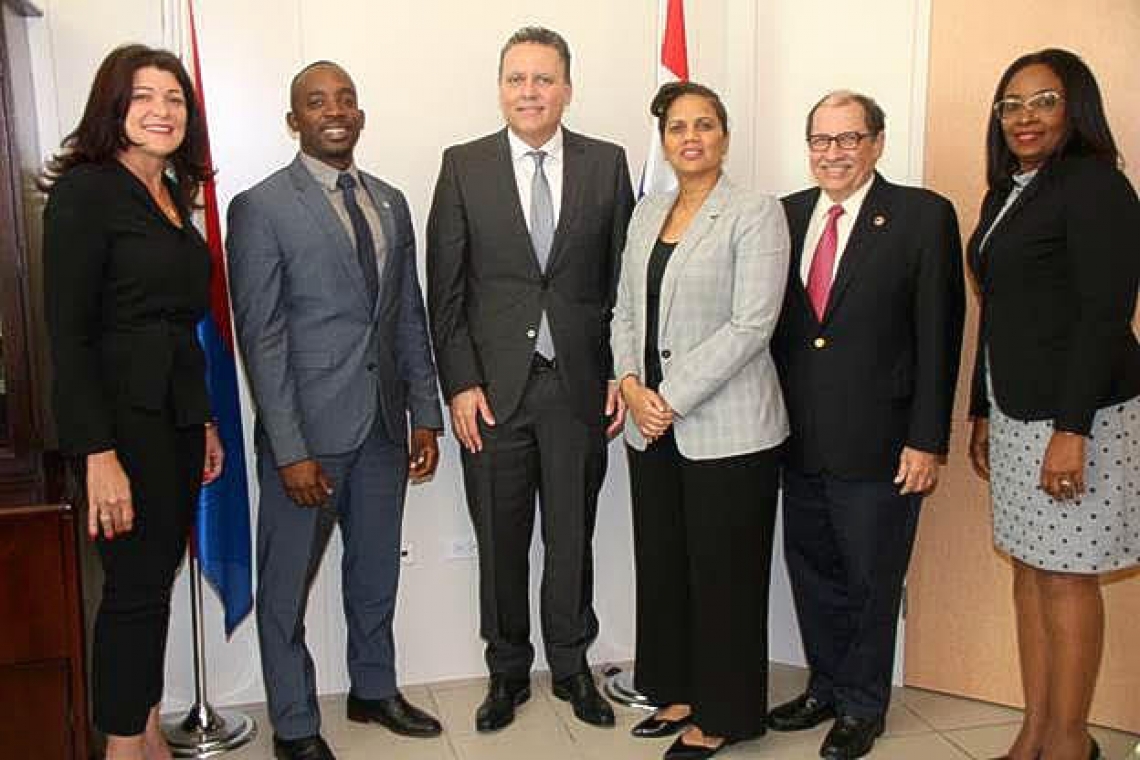From left are Secretary to Director Leila Matroos-Lasten; Minister of Finance Ardwell Irion, interim CBCS President Jose Jardim; CBCS Director Raquel Lo Fo Wong; Advisor to the Board of Directors Ron Gomes Casseres and Executive assistant to the Board of Directors Nihaila Eustachia.
PHILIPSBURG--Finance Minister Ardwell Irion has made it clear to the Central Bank for Curaçao and St. Maarten (CBCS) that St. Maarten will not be increasing its foreign exchange licence fees as proposed by Curaçao.
Curaçao had proposed increasing the fees by one per cent in an effort to save the ailing Girobank, which is based solely in Curaçao. Irion communicated St. Maarten’s position during a meeting with CBCS officials earlier this week. The matter was discussed locally in the Council of Ministers meeting on Tuesday, where Irion said he again emphasized that St. Maarten should not increase its fees, the minister told this newspaper. Curaçao had never formally informed St. Maarten about its proposal.
“It must be emphatically stated that St. Maarten is not considering increasing its licence fees. This is a measure being considered for Curaçao by the government of Curaçao,” Irion said in a press release on the matter, which he had announced earlier during the Council of Ministers press briefing.
He made clear that the one per cent licence fee currently charged on foreign exchange transactions by commercial banks to clients is collected by St. Maarten and by Curaçao and is deposited directly into the treasury of the respective countries.
“What is paid on St. Maarten is received by the government of St. Maarten and the same goes for Curaçao,” he said.
Irion’s meeting with the CBCS was with member of CBCS’ supervisory Dennis Richardson, and CBCS’ board. During these meetings, an update was provided on the latest developments with the emphasis on the solvency of the Giro Bank and actions taken by the CBCS, and the proposal of the increase of the licence fee for Curaçao in connection with this. Discussions were also held on the performance of the economies of both countries and the concerns that are foreseen.
While St. Maarten’s economy grew in 2019 by 5.5 per cent and is expected to grow in 2020 by 3 per cent, the growth is primarily the result of insurance pay-outs and personal funds that have been used for rebuilding, Irion said in the release.
“St. Maarten is running the risk of losing market share as key areas have not recovered fast enough, thus allowing competitors to capture market share. This could had been mitigated if more projects had been executed, be it through commercial bank funding or the Trust Fund.”
Irion has asked CBCS to finance a conference on Blockchain and digital currency, as well as carry out awareness campaigns for the community of St. Maarten on financial education, which includes banking in general.







